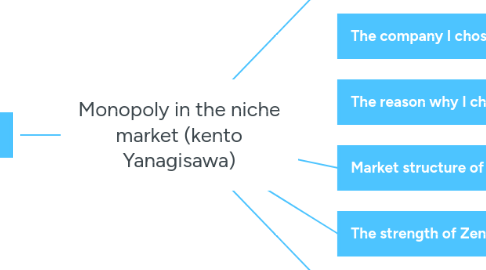
1. The strength of Zenkoku hosho
1.1. The fact that they are the only independent company in the market , allows them to easily form an alliance with various banks and unions. This leads to stable income.
1.2. Their biggest strength is that they basically don't have a legit competitor
2. Conclusion
2.1. Honestly, Zenkoku Hoshou is in a stable and healthy financial state.
2.1.1. I Couldn't find any notable weaknesses.
2.2. The question is
2.2.1. Do we make an investment in this company
2.2.1.1. If we think of short term(3 to 5 years), I think Zenkoku Hosho is a solid place to make a investment.
2.2.1.1.1. It will be a low risk low return investment, because it's growth is linear.
2.2.1.2. If we think of long term( more than 10 years)
2.2.1.2.1. It will be dangerous to invest in Zenkoku Hoshou
3. The purpose of this report
3.1. Is to improve the accuracy of valuing company
3.1.1. Enable us to make good investment decision
4. Market structure of credit guarantee service of mortgage loan.
4.1. Normally, credit guarantee service for housing loan are provided by the bank subsidiary.
4.2. This is because Banks are the loan seller.
4.2.1. The bank do the mortgage contract and it's subsidiary is compensating for the bad debt.
4.2.1.1. ....wait a minute????
4.2.1.1.1. The bank should transfer the risk of bad debt to other institution, not their subsidiary. Other wise there is no point to set up the credit guarantee.
4.3. + The credit guarantee service for mortgage loan is increasing demand
4.3.1. Simply because the number of mortgage loan contract is increasing in Japan.
4.3.1.1. And Banks don't want to give a credit guarantee service to low-social trust costomers
4.4. Credit guarantee service gains low rate of profit and not much institution is trying to enter this market
4.4.1. This leads to
5. The financial analysis
5.1. Compared Zenkoku Hosho with Risona Bank
5.1.1. Had to compare it to a bank because there is no competitor
5.1.2. The comparison is made through 5 financial indicator which each of them is connected with 5 separate perspective.
5.1.2.1. ROE; total strength
5.1.2.1.1. Zenkoku hosho's ROE doubled the bank's ROE. Both had it stable in the past couple years.
5.1.2.2. Net profit margin; profitability
5.1.2.2.1. Zenkok u hoshou had much higher profit margin over bank. Zenkoku Hosho had a stable NPM and Bank's NPM had fluctuated.
5.1.2.3. Total asset turnover; efficiency
5.1.2.3.1. They both had a low asset turnover ratio
5.1.2.4. Equity ratio; liquidity
5.1.2.4.1. Zenkoku Hosho had far better equity ratio.
5.1.2.5. Sales growth rate; growth potential
5.1.2.5.1. Zenkoku Hosho has a stable and higher sales growth rate over the bank.
6. The reason why I chose this company is that
6.1. It had the highest operating margin in the Tokyo stock exchange
6.1.1. Which means
6.1.2. They inccur low volume of cost; cost of goods sold, depreciation, selling cost
6.1.2.1. This make sense because they are a credit guarantee provider. That's the only business they operates.
7. The company I chose
7.1. Zenkoku Hoshou
7.1.1. Company that provides credit guarantee services (mostly for mortgage loans)
7.1.2. What is credit guarantee service?
7.1.2.1. Contract that you have to make before entering in to loan contract
7.1.2.2. So that even if you couldn't fulfill the payment, the third party can compensate for that amount

